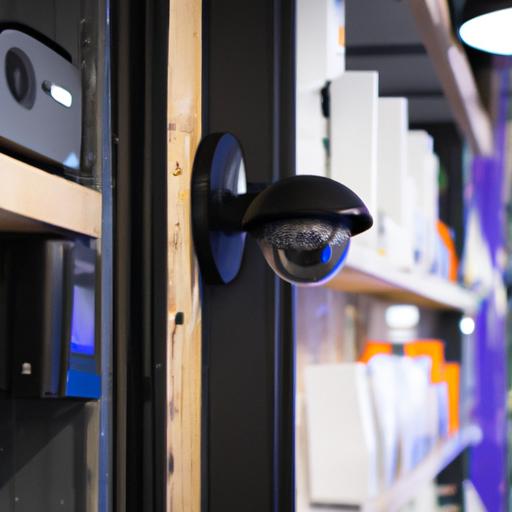Small Business Security Systems: Safeguarding Your Business with Confidence

As a small business owner, you invest your heart and soul into your venture. You work tirelessly to build your brand, attract customers, and generate profits. But have you considered the security of your business? With the increasing rates of theft, vandalism, and cybercrime, it has become crucial to prioritize the implementation of small business security systems. These systems not only protect your assets but also offer peace of mind, allowing you to focus on what you do best.
Importance of Small Business Security Systems
Imagine a scenario where you arrive at your business premises one morning only to discover a break-in. Valuable equipment and sensitive data are gone, leaving you devastated. Such incidents can have a severe impact on your business, leading to financial losses, disrupted operations, and damaged reputation. This is where small business security systems come into play.
Implementing a comprehensive security system acts as a powerful deterrent to potential criminals. The sight of surveillance cameras and alarm systems sends a clear message that your business is well-protected, dissuading intruders from targeting your premises. Moreover, security systems provide timely alerts in case of any unauthorized access or suspicious activities, allowing you to take immediate action and minimize potential damage.
Benefits of Implementing Small Business Security Systems
Investing in small business security systems offers a range of benefits that go beyond mere protection. These systems serve as a shield, safeguarding your business from various threats and vulnerabilities. Here are some key advantages:
-
Enhanced Employee Safety: Your employees are the backbone of your business, and their safety should be a top priority. Security systems create a secure working environment, reducing the risk of workplace accidents, violence, and unauthorized access.
-
Prevention of Theft and Inventory Loss: Small businesses are often targets for theft, whether it’s shoplifting, employee theft, or organized crime. By installing security cameras and access control systems, you can deter thieves and significantly reduce inventory shrinkage.
-
Protection of Valuable Assets: Your business assets, such as equipment, inventory, and proprietary information, are invaluable. Small business security systems provide round-the-clock monitoring, ensuring that your assets are protected from theft, vandalism, and unauthorized access.
-
Remote Monitoring and Control: Modern security systems offer the convenience of remote access, allowing you to monitor your business from anywhere, at any time. With real-time video surveillance and remote arming/disarming capabilities, you can stay connected and in control, even when you’re away.
-
Potential Insurance Premium Reductions: Insurance companies recognize the value of security systems in mitigating risks. By investing in small business security systems, you may be eligible for insurance premium reductions, saving you money in the long run.
In conclusion, small business security systems are not just a luxury; they are a necessity for any business looking to protect its assets, employees, and reputation. In the next section, we will delve deeper into the types of small business security systems available and how they can be tailored to meet your specific needs and risks. So, let’s explore the world of security systems together and take the first step towards a safer and more secure business environment.
Understanding Small Business Security Systems
Definition and Components of Small Business Security Systems
Before delving into the different types of small business security systems, it’s essential to understand what they entail. Small business security systems are comprehensive solutions designed to protect your business premises, assets, and personnel from various security threats. These systems integrate multiple components to create a robust security infrastructure.
The key components of small business security systems typically include:
-
Surveillance Cameras: Also known as CCTV (Closed-Circuit Television) cameras, surveillance cameras are a fundamental element of any security system. They capture and record video footage of your business premises, providing visual evidence of any incidents or suspicious activities.
-
Access Control Systems: Access control systems regulate entry and exit points to your business premises. These systems can include keypads, card readers, biometric scanners, or even smartphone-based access. By limiting access to authorized personnel only, you can prevent unauthorized entry and enhance overall security.
-
Intrusion Detection Systems: Intrusion detection systems are designed to detect and alert you of any unauthorized entry attempts into your business premises. These systems utilize sensors, such as motion detectors or door/window sensors, to trigger alarms and notify you or a security provider in real-time.
-
Alarm Systems: Alarm systems play a vital role in alerting you and deterring potential intruders. They can have various components, including sirens, strobe lights, and panic buttons. When triggered, they create a loud noise or visual display, attracting attention and increasing the chances of immediate response.
-
Fire Protection Systems: Fire is a significant threat to any business. Fire protection systems, such as smoke detectors, fire alarms, and sprinkler systems, are crucial for early detection and rapid response in case of a fire emergency. These systems can save lives and minimize property damage.
Different Types of Small Business Security Systems
Small business security systems come in various types, each catering to specific security needs and requirements. Here are the five main types:
-
Video Surveillance Systems: These systems utilize cameras strategically placed throughout your business premises to capture video footage. With advancements in technology, video surveillance systems now offer high-quality video recordings, remote access, and advanced features like motion detection and facial recognition.
-
Access Control Systems: Access control systems manage who can enter or exit your business premises. They can include keycards, PIN codes, biometric identifiers, or even smartphone-based access. Access control systems provide a secure and convenient way to control and monitor entry points.
-
Intrusion Detection Systems: Intrusion detection systems are designed to detect unauthorized entry attempts. They use sensors to monitor doors, windows, and other vulnerable areas. When triggered, they generate alerts, allowing you to take immediate action.
-
Alarm Systems: Alarm systems are an essential component of small business security. They create audible alerts when triggered, alerting you and others nearby of a potential threat. Alarm systems act as a strong deterrent and can be connected to monitoring services for additional protection.
-
Fire Protection Systems: Fire protection systems are crucial for any business. They include smoke detectors, fire alarms, and sprinkler systems, which provide early detection and rapid response in case of a fire emergency. Fire protection systems are essential for safeguarding lives and property.
Understanding the components and types of small business security systems is the first step towards creating a robust security infrastructure. In the next section, we will explore the factors you should consider when choosing the right security system for your small business. Let’s dive in!
Factors to Consider when Choosing Small Business Security Systems
When it comes to selecting the right small business security system, several factors need to be taken into consideration. By carefully evaluating these factors, you can ensure that the chosen security system aligns with your specific needs and provides optimal protection for your business.
A. Budget Constraints
Before diving into the world of security systems, it’s essential to establish a budget. Determine how much you are willing to invest in security measures while keeping in mind the long-term benefits and potential cost savings. Remember, compromising on security quality due to a tight budget may leave your business vulnerable to threats. Seek a balance between affordability and effectiveness.
B. Size and Layout of the Business Premises
The size and layout of your business premises play a significant role in determining the type and number of security system components required. Larger spaces may need a more extensive network of surveillance cameras and access control points to ensure comprehensive coverage. Conversely, smaller businesses might find a simpler system sufficient. Assess your premises and identify potential weak points that require additional security measures.
C. Specific Security Needs and Risks
Every business has unique security needs and risks. Conduct a thorough assessment of your business to identify the specific vulnerabilities you need to address. Are you in a high-crime area? Do you handle sensitive customer data? Are there valuable assets that need protection? Understanding your specific security requirements will help you select the appropriate security system components and features.
D. Scalability and Future Expansion
As your business grows and evolves, so too should your security system. Consider the scalability of the chosen security system. Will it accommodate future expansion? Can it be easily upgraded or integrated with new technologies? Planning for the future ensures that your investment remains relevant and effective in the long run.
E. Integration with Existing Security Measures
If you already have some security measures in place, such as locks, alarms, or security personnel, it’s crucial to ensure that the chosen security system integrates seamlessly with these existing measures. A cohesive security approach enhances overall effectiveness and minimizes any potential gaps or redundancies.
By taking these factors into account, you can make an informed decision when selecting small business security systems. In the next section, we will explore the benefits of implementing these security systems in more detail, shedding light on how they can protect your business and provide peace of mind. So, let’s continue our journey towards a secure business environment.
Benefits of Small Business Security Systems
Small business security systems offer a multitude of advantages that extend far beyond basic protection. Let’s explore some of the key benefits that these systems bring to your business:
A. Crime Deterrence and Prevention
The mere presence of small business security systems acts as a strong deterrent against criminal activities. Potential intruders are less likely to target a business that has visible security measures in place. Surveillance cameras, alarm systems, and prominently displayed signage send a clear message that your business is protected. Criminals are more likely to move on to easier targets, reducing the risk of break-ins, vandalism, and theft.
B. Employee Safety and Theft Prevention
Creating a safe working environment for your employees is crucial. Small business security systems contribute to employee safety in multiple ways. Surveillance cameras not only deter external threats but also discourage internal theft and misconduct. Knowing that their actions are being monitored, employees are less likely to engage in fraudulent activities. Moreover, security systems can help identify and resolve workplace disputes or conflicts, fostering a harmonious work environment.
C. Protection of Valuable Assets and Data
Your small business possesses valuable assets, both physical and digital. Security systems ensure the protection of these assets, minimizing the risk of loss, damage, or unauthorized access. Video surveillance cameras provide a watchful eye over your premises, allowing you to monitor activities and identify potential threats. Access control systems restrict entry to sensitive areas, ensuring that only authorized personnel can access valuable assets. In the digital realm, cybersecurity measures safeguard your data and protect against potential breaches or hacking attempts.
D. Remote Monitoring and Control
Modern small business security systems offer the convenience of remote monitoring and control. With the help of mobile apps and online platforms, you can keep an eye on your business from anywhere, at any time. Real-time video feeds, motion detection alerts, and remote arming/disarming capabilities provide you with peace of mind, even when you’re away. Whether you’re on a business trip or simply want to check in after hours, remote access empowers you to stay connected and in control of your business’s security.
E. Insurance Premium Reductions
Investing in small business security systems can potentially lead to reduced insurance premiums. Insurance companies recognize the value of security measures in minimizing risks and potential losses. By implementing robust security systems, you demonstrate your commitment to safeguarding your business. This proactive approach can often lead to lower insurance premiums, resulting in long-term cost savings for your business.
In the next section, we will explore some essential factors to consider when choosing the right small business security system for your specific needs. So, let’s delve deeper into the world of security systems and discover the best fit for your business.
Tips for Implementing Small Business Security Systems
Securing your small business requires more than just installing security systems. It involves careful planning, assessment, and proactive measures to ensure comprehensive protection. Here are some essential tips to consider when implementing small business security systems:
A. Conducting Security Assessments
Before investing in any security system, it’s crucial to conduct a thorough security assessment of your business premises. This assessment helps identify potential vulnerabilities, assess security risks, and determine the specific security needs of your business. Consider factors such as the layout of your premises, access points, existing security measures, and areas of high-value assets or sensitive data. By understanding your unique security requirements, you can tailor your security system accordingly.
B. Developing a Comprehensive Security Plan
Once you have conducted a security assessment, it’s time to develop a comprehensive security plan. This plan should outline the specific security measures you will implement, including the types of security systems, their locations, and integration with existing systems. It should also address emergency procedures, such as evacuation plans and response protocols. A well-defined security plan ensures that all aspects of your business’s security are covered and provides a roadmap for implementation.
C. Choosing the Right Security System Provider
Selecting the right security system provider is crucial for the success of your security implementation. Look for a reputable provider with a proven track record in the industry. Research customer reviews, ask for recommendations, and evaluate the provider’s expertise, reliability, and customer support. A reliable provider will not only offer quality security products but also provide guidance and assistance throughout the installation and maintenance process.
D. Proper Installation and Setup
Proper installation and setup of your security systems are essential to ensure their effectiveness. Engage professional installers who have experience in installing small business security systems. They will ensure that cameras, alarms, access control systems, and other components are strategically placed for optimal coverage. Additionally, they will configure the system settings according to your specific requirements, such as motion detection sensitivity and alarm thresholds, to minimize false alarms while maximizing security.
E. Employee Training and Awareness
Your employees play a crucial role in maintaining the security of your business. It’s important to provide thorough training on how to use the security systems effectively, including arming and disarming alarms, accessing surveillance footage, and reporting suspicious activities. Emphasize the importance of following security protocols, such as proper badge usage and visitor management. Regularly reinforce security awareness through reminders, refresher training, and communication channels to keep security top of mind for everyone.
By following these tips, you can ensure a robust and effective implementation of small business security systems. Remember, security is an ongoing process, so periodically review and update your security measures to adapt to changing threats and business needs. Next, we will conclude our article by summarizing the importance and benefits of small business security systems.
Conclusion
As a small business owner, the security of your business should be a top priority. Implementing small business security systems not only protects your assets but also provides numerous benefits. These systems deter criminals, enhance employee safety, prevent theft and inventory loss, and protect your valuable assets and data. With remote monitoring and control capabilities, you can stay connected and in control of your business, even when you’re away.
By investing in small business security systems, you not only safeguard your business but also demonstrate your commitment to providing a secure environment for your employees and customers. Insurance companies also recognize the value of these systems, potentially leading to reduced insurance premiums. So why wait? Take action today and secure your business with confidence.
Remember, when choosing small business security systems, consider factors such as budget constraints, the size and layout of your premises, specific security needs and risks, scalability, and integration with existing security measures. Conduct security assessments, develop a comprehensive security plan, choose the right security system provider, and ensure proper installation and employee training.
Don’t let your hard work and dedication be jeopardized by security breaches. Invest in small business security systems and protect what you’ve built. Embrace the peace of mind that comes with knowing your business is safe and secure. Together, we can create a secure environment for your business to flourish.
Conclusion: So above is the Small Business Security Systems: Safeguarding Your Business with Confidence article. Hopefully with this article you can help you in life, always follow and read our good articles on the website: business.musictoob.com




